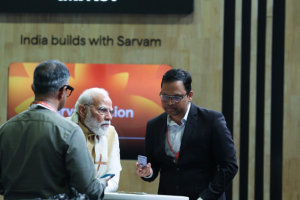Global perceptions of the world’s two biggest economies have undergone a dramatic change – with the United States and its leader Donald Trump now seen in a worse light than China and its President Xi Jinping, a new survey has shown.
Over the past year, the number of surveyed people found to have a positive perception of China increased from 5% to 14%, the Democracy Perception Index survey found.
Meanwhile, the number of surveyed people found to have a positive perception of the United States tumbled from 22% in 2024 to -5% this year, it showed, meaning a greater number of respondents held a negative view of the country than a positive one.
Also on AF: Rogue Communication Devices Found in Chinese Solar Inverters
The Democracy Perception Index was commissioned by Denmark-based non-profit Alliance of Democracies, which says it aims to “strengthen the spine of the world’s democracies” and “encourage greater cooperation between nations”.
The democracy perception survey was conducted by polling firm Nira Data between April 9 and 23 and its results were based on “nationally representative interviews with over 111,273 respondents from 100 countries”, the Alliance of Democracies said.
The survey represents 91% of the global population, it added.
Among the most striking findings of the survey was that more than three-quarters of countries around the world now hold a more positive view of China than the US.
That is an extraordinary turnaround – the first time that more countries hold a positive view of China than of the United States. Meanwhile, the US’s perception across the world is now nearly as bad as that of Russia.
Sharp fall in perceptions of the US
Out of the 96 countries surveyed, 79% held a more positive view of China, while only 21% had a more positive view of the US.
Net perceptions of China were higher than the United States in Asia, Latin America, the Middle East, North Africa and even in Europe. Meanwhile, US allies such as Israel, South Korea, Japan, India, Poland, and Ukraine reported more positive net perceptions of the US.
“I’m not surprised that perceptions of the United States have fallen so sharply,” Alliance founder and former NATO Secretary General Anders Fogh Rasmussen said in the report.
In a separate statement to Reuters, he explained that perceptions of the US slipped because “President Trump has triggered a trade war, scolded Ukraine’s president in the Oval Office, left allies feeling vulnerable and enemies emboldened.”
“It’s no surprise that opinions have slipped, even among people like me who spent their lives admiring the United States and what it stood for,” he added.
Xi trumps Trump
Another key finding of the survey was that China’s authoritarian leader President Xi Jinping is now being seen more favourably than his democratically elected American counterpart Donald Trump.
The survey found Trump was the most globally recognized political leader, with 85% of respondents saying they know who he is, while 63% said they were familiar with Xi.
But Trump also had an almost universal negative perception rating, the survey showed. Trump held a net negative rating in 82% of countries around the world, while Xi was viewed negatively in 44% of the surveyed nations.
Only 27% people globally view Trump positively, in comparison to an average of 32% respondents who viewed Xi in a positive light. The survey noted that while Xi’s perception had improved by two percentage points, Trump’s perception had declined by 30 percentage points.
Trump was found to be more negatively perceived than even Russian President Vladimir Putin, who continues to face global criticism for his continued war on Ukraine.
Trump’s close aide Elon Musk also had a net negative perception rating, with an average of 42% people globally viewing him negatively.
Musk’s political leanings, and recent support for divisive leaders such as the German far-right have fuelled public anger against the billionaire. His electric vehicle firm Tesla has, as a result, seen profits crash by 71% over the first three months of this year.
Why these findings matter
China has long been seen by many as the world’s big bad guy due to its trade and diplomatic practices, and that image only worsened in the aftermath of the Covid-19 pandemic.
According to Pew Research, perceptions of China became particularly negative in advanced countries after Xi took office in 2013. Over the years, that worsened with trade frictions, Beijing’s increasing claims in the South China Sea, a global push to establish its power via the Belt and Road Initiative and its use of economic might for its so-called “debt trap diplomacy”.
The common view that China had fumbled its handling of Covid-19 and that its subsequent strict shutdowns had plunged global supply chains into chaos entrenched its negative perception.
As of 2022, 82% Americans held an unfavourable view of China and the country’s net perception worldwide was negative too.
Subsequent upheaval in US politics, however, coupled with China’s extensive advances in emerging technologies such as electric vehicles and clean energy marked a turnaround in how the country was perceived.
That change has been particularly pronounced over the past few months, however. China’s response to Trump’s tariff aggression has played a major role in boosting its perception, with many users on social media cheering Beijing’s retaliatory moves against the US and a refusal to lay down arms in the trade war.
Globally, Beijing has also moved swiftly to fill in gaps left by the US, by seeking to build alliances with former rivals such as the European Union and India, pledging more medical, economic and technological support for Africa, affirming continued commitment to tackling climate change and even promising greater resources to organisations such as the United Nations.
Meanwhile, China has also benefitted from a falling trust in the Trump Administration, which has notoriously gone back and forth on large tariffs against major trading partners — moves that shocked the world and caused major upheaval in global stock markets.
Within the US too, those moves have translated into an improvement in views on China. Pew Research reported in April that for the first time in five years, the share of Americans with an unfavourable opinion of China had fallen from the year before.
The improving perception on China could bring some much-needed respite for the world’s second largest economy in the form of investments and inflows into its stock markets. The country is teetering at the edge of deflation and has struggled to lift its growth weighed down by a prolonged real estate crisis and weak consumer confidence after its Covid-era economic shocks.
At the same time, however, an emboldened China presents concerns of its own.
The void left by the US raises the risk of China increasing its aggression in the South China Sea and mounting an invasion of Taiwan, which it views as its own territory.
The dangers of its increasing influence have already become apparent in organisations like the United Nations, where it has reportedly deployed dozens of “self-described non-governmental organisations” to drown out criticism of its human rights abuses, especially in its western province Xinjiang.
- Vishakha Saxena
Also read:
China Touting Geneva Trade Agreement With US as a Victory
Fear of Huge Job Losses Led to China’s Move to Discuss Tariffs
When China Becomes More Credible Than Hermes
How One YouTuber Defied The US-China Trade War
China Science Vs US Export Controls
US Officials Told: Use Encryption to Avoid Chinese Phone Hacks
US Looking to Ban Sales of China’s TP-Link Routers
Chinese Spies Targeting Dutch Tech: Intelligence Agency
US, EU Can’t Meet Climate Goals Without China’s Cheap Green Tech
China’s Huawei ‘Hoping Its New AI Chip Can Outpower Nvidia’
























